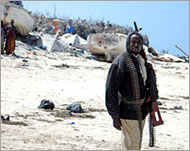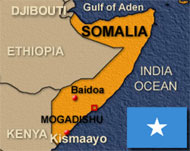Somali factions in Sudan for talks
The head of the Arab League on Wednesday greeted the Somalian president and representatives of Islamic militias that control most of the warn-torn country for talks in Khartoum on Wednesday.

Amr Moussa told The Associated Press shortly before meeting with the Sudanese president: “The goal of this meeting is to save Somalia.”
Representatives from Egypt, Libya, Djibouti and several other Arab countries gathered in Khartoum for the peace talks mediated by Sudan, the current chair of the Arab League.
Moussa said the one-day meeting scheduled for Thursday between delegates from the Somalian transitional government and the country’s dominant warring faction was geared at obtaining “full conciliation” from both parties.
Meanwhile, Abdullahi Yusuf, Somalia’s interim president, together with Ali Mohamed Gedi, prime minister, and Sharif Hassan Sheikh Aden, parliamentary speaker; met on Wednesday night in Khartoum with Lam Akol, the Sudanese foreign minister, to prepare for the talks.
Militias under the umbrella of Somalia’s Islamic Courts Union, a group with members ranging from moderate Muslims to fundamentalists who want to establish rule by Islamic law, took Mogadishu earlier this month after sporadic battles with an alliance of regional commanders that had gone on for months and killed 330 people, most of them civilians.
For common good
A 10-man delegation representing the Islamic militias travelled from Somalia to Sudan on board a plane sent by the Arab League.
The team was led by Mohamed Ali Ibrahim and included the deputy head of the Islamic Courts Union, Sheikh Hussein Mohamud Jumaale, said the group’s chairman, Sheikh Sharif Sheikh Ahmed.
 |
|
Islamist militamen have ousted |
“We have to make concessions for the common good of Somalia,” Sheikh Sharif told the AP, adding, however, that his group rejects government plans to deploy peacekeepers to stabilise the country.
He met an Arab League delegate in the Somali city of Jowhar shortly before the delegation left for Sudan, Aljazeera’s correspondent in Mogadishu reported on Wednesday.
He said: “We do not know the agenda yet but we believe it has something to do with the restoration of peace and stability that we are also trying to bring in Somalia.”
Sheikh Sharif said the Islamists had already restored order to parts of the country under their control.
On his arrival in Khartoum, delegation chief Ibrahim, a prominent Somali Muslim leader, said: “We have come to the negotiations without any pre-conditions, with the sole aim of making them a success.”
International concern
The Islamist leaders portray themselves as a new force capable of bringing the order for which many Somalis long. But terror allegations have caused international concern.
Somalia’s interim president, threatened by the military and political dominance of the Islamist group, has charged it is backed by international extremists, echoing US accusations that some of its leaders are linked to al-Qaeda.
On Tuesday, Yusuf said the Islamic Courts Union may be less interested in negotiating with his government than in pursuing its own, unknown agenda.
 |
|
Yusuf wants the Islamists to |
“Yes, the Islamists’ forces have an international reach and they have many collaborators from around the world… They are in the thousands,” Yusuf said after discussing the Somalia situation with Patrick Mazimhaka, African Union Commission deputy chairman.
“They could not have overtaken Mogadishu if they did not have the backing of extremists from around the world.”
The president had said he would only meet the Islamist leaders once they recognised his government and showed a commitment to democracy.
He also said he would only open talks with the Islamic courts group after it withdrew its militias to Mogadishu, laid down arms and accepted the transitional constitution.
Yusuf’s government has asked Uganda and Sudan to send peacekeepers under the banner of an eastern African group, the Intergovernmental Authority on Development, which has led peace efforts on Somalia.
Al-Qaeda suspects
Separately, a top US diplomat has asked for the Islamic Court’s help to capture three al-Qaeda suspects believed to be in Somalia.
 |
|
The US says plotters of the 1998 |
Jendayi Frazer, US assistant secretary of state for African Affairs, said on Tuesday in Uganda that the suspects “are of the highest, highest priority in terms of capturing”.
Frazer said it was clear that there were foreign terrorists in the country and that the US had made the same request of the transitional government.
The wanted men are accused of the 1998 bombings of the US embassies in Kenya and Tanzania. They are a Comorian, Fazul Abdullah Mohammed, Kenyan Saleh Ali Saleh Nabhan and Abu Taha al-Sudani, a Sudanese.
“The best way to get America’s support to the Somali people in a way that doesn’t undermine our interests and their interests is for them to give up these foreign terrorists,” Frazer said.